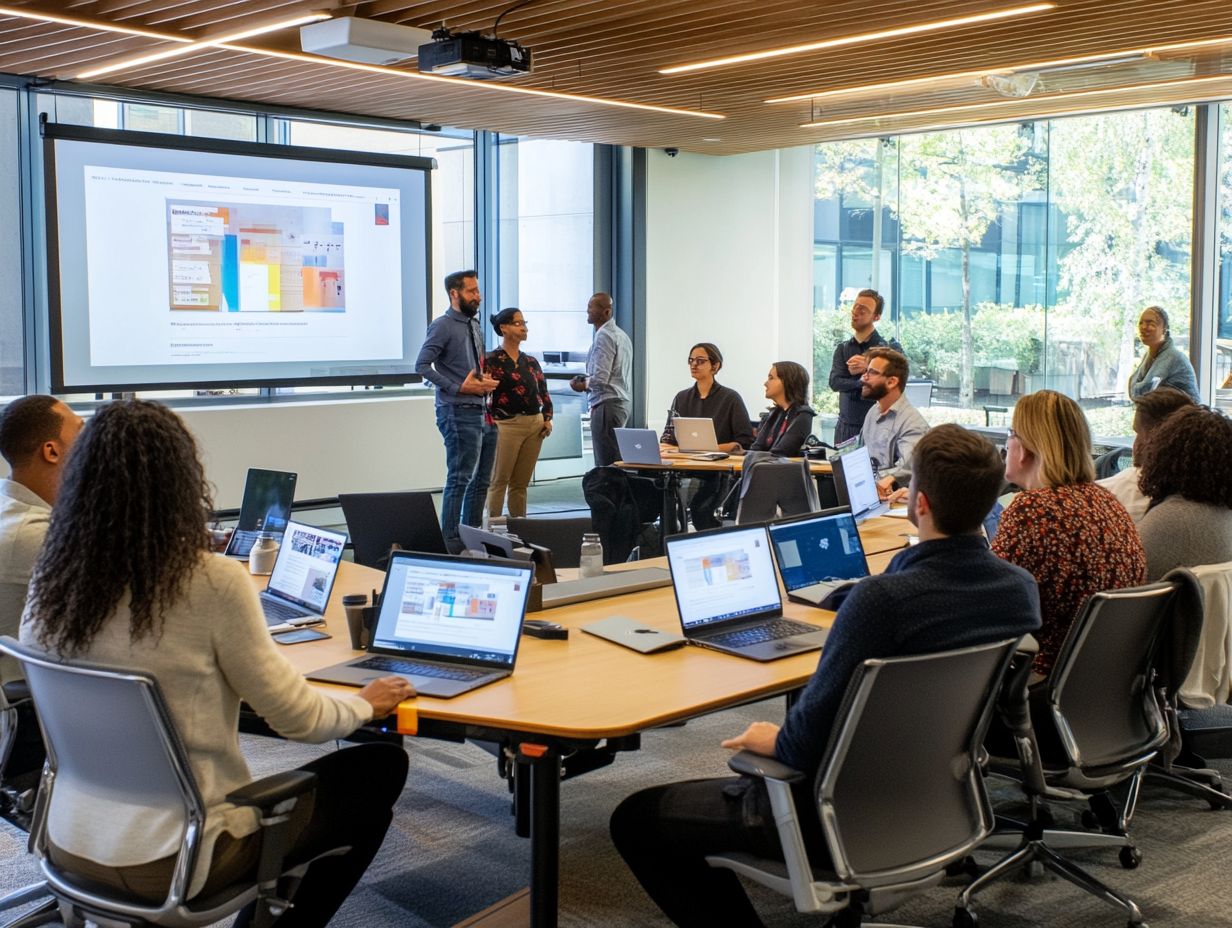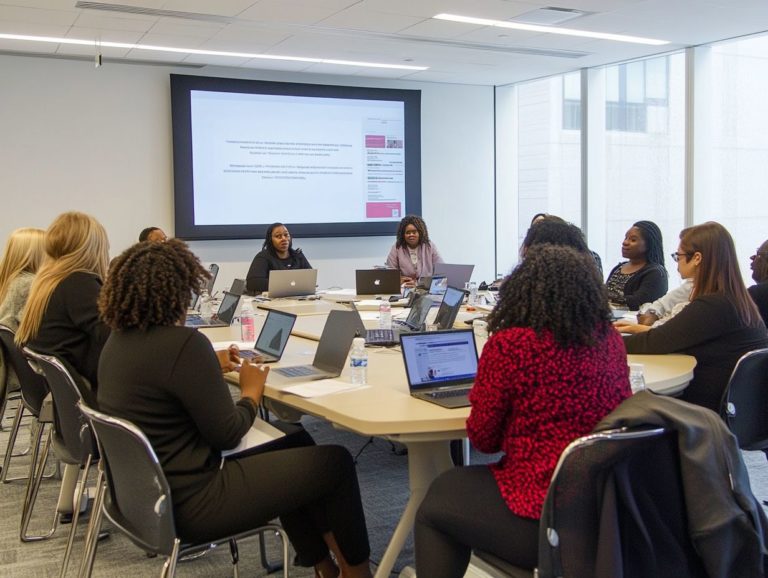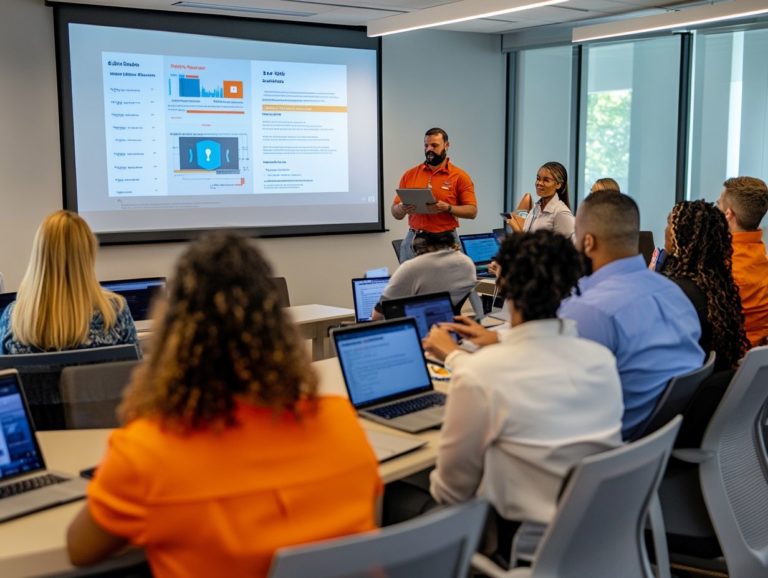the need for tailored training in large companies
In today’s rapidly evolving business landscape, large companies encounter distinct challenges that can impede employee development and overall effectiveness.
Tailored training programs present a compelling solution by addressing specific needs and cultivating a culture of continuous improvement. This article delves into the importance of customized training, common hurdles large organizations face, and the concrete benefits that arise from a personalized approach.
You will uncover effective strategies for implementation and learn how to measure success, ensuring that your training initiatives yield impactful results.
Contents
Key Takeaways:

Tailored training is key to unlocking potential in large companies.
Identifying and overcoming common obstacles leads to effective training.
Tailored training improves employee engagement and performance while utilizing best practices and evaluating key metrics.
The Importance of Tailored Training in Large Companies
In today s competitive business landscape, the importance of tailored training is paramount. It aligns employee training initiatives with corporate objectives and addresses specific skill gaps within the workforce.
This approach fosters high performance and ensures sustainable growth. Companies like GBS Corporate Training highlight the need for a well-structured learning development framework that enhances job performance and elevates employee satisfaction and retention.
Investing in this training sets your organization up for remarkable long-term success!
Understanding the Unique Needs of Large Companies
Large companies present unique training needs shaped by their organizational structure and diverse workforce. Understanding various employee roles is essential for identifying the specific training solutions needed to enhance job performance.
Teams are often spread across different locations. This makes training more complex and requires careful planning.
Corporate trainers are essential in navigating these intricacies, ensuring that training programs are precisely tailored to meet the specific needs of different departments. This customization elevates employee satisfaction and cultivates a sense of belonging and engagement within the workforce, ultimately strengthening the company s overarching organizational culture.
Challenges Faced by Large Companies in Training
Large companies frequently face significant challenges when implementing effective training programs. You may find yourself navigating skill gaps among employees, ensuring compliance with industry standards, and integrating technology into training initiatives.
All these factors can impede the overall learning development process and diminish employee engagement.
Identifying and Addressing Common Obstacles

Identifying and addressing common obstacles in large company training demands a strategic approach, including a comprehensive assessment of what training is required, innovative training strategies, and the establishment of feedback loops to enhance motivation and engagement among employees.
To effectively pinpoint these challenges, implement surveys designed to gather employee insights and conduct performance mapping to identify skill gaps. This process clarifies areas that require improvement and nurtures a culture of openness within the organization.
Once you have recognized the obstacles, introducing solutions like continuous learning initiatives and targeted coaching sessions allows you to create tailored development plans. These strategies enable your workforce and foster a cycle of growth that ultimately boosts productivity and satisfaction.
Engaging employees in their learning journey ensures that obstacles are not merely identified but actively addressed, creating an environment ripe for success.
Benefits of Tailored Training for Large Companies
Tailored training helps employees feel more engaged. This approach elevates performance levels and improves training outcomes.
By implementing customized programs, organizations can effectively address skill gaps while promoting upskilling and retaining top talent.
Improving Employee Engagement and Performance
Enhancing employee engagement through tailored training can greatly boost your organization’s success! By fostering a culture of continuous learning, you show a commitment to personal development and effective coaching.
When you implement interactive training programs designed for your teams, you elevate the learning experience and cultivate a sense of belonging among employees.
This personalized approach invites participation and encourages feedback, ultimately increasing motivation. Engaged employees are much more likely to embrace challenges and strive for excellence.
By focusing on each employee’s unique strengths and needs during coaching sessions, you create a dynamic work environment. Improved skills directly translate into better results, reinforcing a positive cycle of growth and satisfaction.
How to Implement Tailored Training in Large Companies
Implementing tailored training requires a strategic framework that integrates flexible training solutions, innovative technology, and well-defined initiatives.
This approach should adapt to the unique needs of different employee groups, including offering short courses aimed at skill development.
Top Tips for Effective Training

Identifying best practices can significantly enhance employee satisfaction and performance, leading to a more engaged workforce that meets organizational goals.
Focus on creating comprehensive onboarding programs that seamlessly introduce new hires to your company culture and the essential skills they need. A well-structured onboarding process is crucial for retention and productivity.
Incorporating coaching into these programs provides ongoing support. Employees receive personalized guidance that fosters growth and skill refinement. This combination promotes a culture of learning, builds confidence, and fosters competence, ultimately driving better results.
Measuring the Success of Tailored Training
Measuring the success of tailored training initiatives requires identifying key metrics and evaluation methods that effectively assess training effectiveness.
Doing so ensures training outcomes align with corporate objectives and employee development goals.
Key Metrics and Evaluation Methods
Key metrics are important numbers that show how well the training is working. They are essential for assessing the effectiveness of tailored training programs, shaping employee satisfaction and driving performance improvement.
Measuring completion rates helps gauge participant engagement. Pre- and post-training assessments offer insights into knowledge retention and skill acquisition, allowing for comprehensive evaluations of learning outcomes.
Gathering employee feedback through surveys helps identify gaps and areas for enhancement. Analyzing these metrics collectively allows you to refine training initiatives, ensuring that future programs remain relevant and impactful.
Frequently Asked Questions
In conclusion, tailored training is vital for large companies aiming to enhance employee engagement and performance. By implementing effective strategies and measuring success, organizations can create a more motivated workforce.
Take action now! Start implementing tailored training in your organization today!
Why Tailored Training is Crucial for Large Companies

Large companies need tailored training programs. These programs are customized to meet the unique goals and challenges of each organization.
They ensure employees have the skills and knowledge to thrive in their roles.
Importance of Tailored Training
Tailored training is vital for addressing specific challenges and goals. It boosts employee performance and enhances productivity.
Difference Between Tailored and Generic Training
Tailored training is specifically designed for a company s needs. In contrast, generic training is more general and less effective for specific challenges.
Benefits for Employees
Employees benefit from tailored training through increased job satisfaction and improved skills. It also enhances their career prospects and fosters a positive work environment.
Company-Wide Benefits
Tailored training improves employee performance and boosts productivity. A knowledgeable workforce gives the company a competitive edge.
Examples of Tailored Training Programs
Examples include leadership development, technical skills training, customer service training, and diversity training. These programs align with the specific needs of the company and its employees.
Unlock your team’s potential with tailored training! Transform your workforce today and watch your company thrive.






